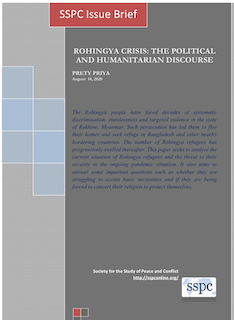Rohingya Crisis: The Political and Humanitarian Discourse

ABSTRACT
The Rohingya people have faced decades of systematic discrimination, statelessness and targeted violence in the state of Rakhine, Myanmar. Such persecution has led them to flee their homes and seek refuge in Bangladesh and other nearby bordering countries. The number of Rohingya refugees has progressively swelled thereafter. Their stories are those of grief and trauma since their families were either killed or separated and women, along with girls, were subjected to violence, including physical assault, rape and torture. Those who managed to escape were severely traumatised. Cox’s Bazar in Bangladesh is now home to the world’s largest refugee camp. This paper seeks to analyse the current situation of Rohingya refugees and the threat to their security in the ongoing pandemic situation. It also aims to answer some critical questions, such as whether they are struggling to access basic necessities and if they are being forced to convert their religion to protect themselves.
ACKNOWLEDGEMENT
"My interest in the area of refugee law and protection grew from various literatures on the issue, the most significant being Author Khaled Hosseini’s novels. Hence, I would always be grateful and look up to all his literary works and will remain inspired. I would like to express my deep gratitude to Professor Niyati Sharma who taught me English in my second semester at JGU, for her guidance, encouragement and useful critiques while working on this research paper. I am honoured to have worked with the Society for the Study of Peace and Conflict (SSPC) as a Research Intern which helped me voice my ideas. I would like to extend a very special thanks to Mr. Animesh Roul, Executive Director of the SSPC for his guidance during the internship tenure. His valuable and constructive suggestions helped me immensely. Finally, I wish to thank my parents for all their support and encouragement throughout my study and experience..”